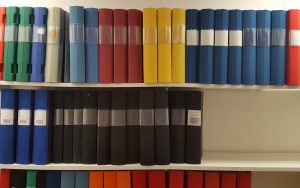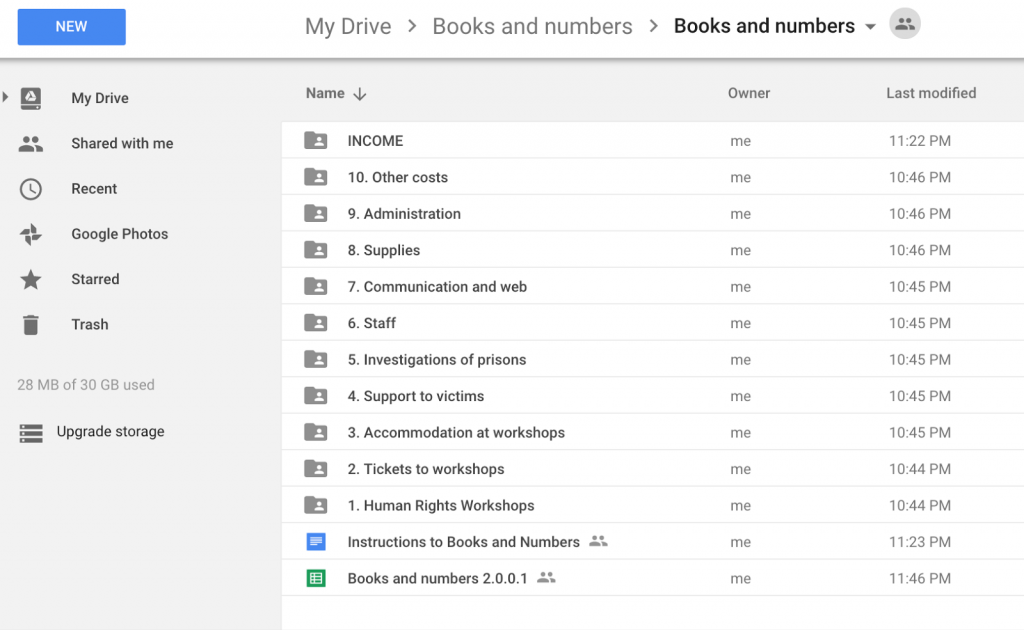Smart Accounting for Human Rights Defenders – Books and Numbers
Many human rights organisations in “difficult countries” — as we call them in the office jargon — have great struggles when administering funds from donors. This post describes some problems we have experienced, and how we have tried to solve them with a very simple but innovative tool called Books and Numbers.
The governments in these countries do everything they can to make life miserable for our partners and all other human rights defenders. They outlaw their organisations, arrest them for nothing and write laws prohibiting international donors to contribute financially to their work. This means that human rights organisations in many of these countries end up with:
- No bank account;
- No bookkeeper;
- No auditor;
- No office;
- No institutional memory;
- No safe internet;
- And no salaries.
Administering funds in such an environment is a difficult and dangerous task.
Still, donors cannot just send funds to these organisations in cash and leave it. They, we, need to account for them to donors, taxpayers, businesses or whoever have contributed.
 So, when asking partners for the accounting we have at several times ended up in a real hassle. We have found ourselves with receipts piling up on our office desk, or received books that have never been audited. And then our partner say they can not discuss this on the phone or over email, and that they do not understand the GPG Suite instructions.
So, when asking partners for the accounting we have at several times ended up in a real hassle. We have found ourselves with receipts piling up on our office desk, or received books that have never been audited. And then our partner say they can not discuss this on the phone or over email, and that they do not understand the GPG Suite instructions.
Finalising a financial report can take months if a problem occur or a partner does not know how to do it. We have ended up making more and more complex templates in Excel hoping they will solve the problems. They do not.
We know we are not alone in this. We send the report back and forth to our partner. They put it on a USB-stick and open it on someone else’s computer that has the latest Excel version, the computer owner prints it for you as they need to finish an article for the web page. And then, when your partner has made all the editing on the paper, they take it to an internet café and edit the report template there. Still something went wrong.
At times such as these, we have ended up meeting partners at neutral airports, trying to sort the accounting out in some dark corner of a café. Naturally this costs a lot more than could possibly be motivated in relation to the modest contributions we give.
Many of these risks were identified in the risk assessment we performed when initiating the cooperation. We just did not have a solution for them.
So, we realised this had to change. We started identifying the main risks in the process and concluded that these were:
- Emailing documents and receipts;
- Transporting them through customs in paper or on USB-sticks;
- Storing them at home or at improvised offices and discussing the accounting problems over phone or email.
Another core problem is that the partners do not have any advanced bookkeeping experience in the first place. The receipts are often kept in plastic folders and the books done manually.
To solve this, we replicated the existing bookkeeping of our partners, within a shared folder on Google Drive. Here our partners can store their receipts electronically and register each receipt in a very simple spreadsheet we created. So when problems occur, we can assist our partners in real-time. And at the end of the contract, our partners simply sign the spreadsheet, no additional auditing required.
This solution enable all of us to have access to the same receipts and the same numbers. But none of it ever leaves the Google cloud. Assistance can now be provided over WhatsApp. Without physical traces lying around during potential raids, this also greatly increases our partners security.
Any hostile government that wants to spy on our cooperation will understand that we communicate with tools such as Gmail, Signal, Whatsapp, etc. Tools that are reasonably safe. Hacking Google Drive is far more difficult than hacking the doors of our partners homes, the plastic folders where they keep their receipts, the carry-ons they travelled abroad with or the backpacks that carry their sneakernet.

We call this cloud and web-based accounting system “Books and Numbers”. And we would be very happy if you check it out and add your expertise to it. You can add comments to the spreadsheet template, and to the the instructions. Please use it and hopefully we can improve it together. There are several challenges left to be solved, these among others involve:
- How to close a project
- How to sign a project electronically
- How make it safe in offline mode
- What routine to use if partner is arrested
We are very much looking forward to comments and contributions.
Please also remember that Books and Numbers is published under Creative Commons license Attribution-Noncommercial-Share Alike. (We started the work with a google template from Kwin and Lo kwinland@gmail.com, so please credit them as well.)


